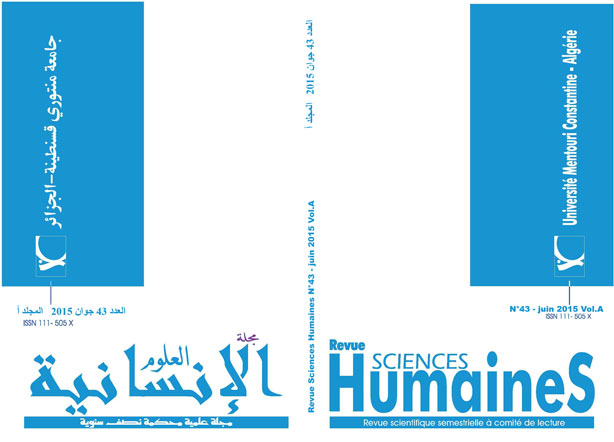</p>العلاقة بين المسؤولية الاجتماعية وتنافسية اقتصاديات دول العالم الإسلامي<p dir="RTL">
Mots-clés :
المسؤولية الاجتماعية, تنافسية اقتصاديات دول العالم الإسلاميRésumé
يهدف المقال لدراسة علاقة المسؤولية الاجتماعية بتنافسية دول العالم الإسلامي، حيث توصلت الدراسة إلى أن مبادئ المسؤولية الاجتماعية تتوافق والشريعة الإسلامية، وأن لهذه المبادئ تأثير إيجابي على تحسين التنافسية في حال الالتزام بتطبيقها، وقد أظهر واقع العالم الإسلامي ضعفا في الالتزام بمبادئها بالنسبة للقطاع العام والخاص، فكان متوسط مؤشرات المسؤولية الاجتماعية في العالم الإسلامي أقل من المتوسطات الدولية، والعلاقة بين المسؤولية الاجتماعية والتنافسية موجبة وقوية بالنسبة لمعظم المؤشرات.
وعليه كانت للدول الأكثر التزاما بمبادئ المسؤولية الاجتماعية تنافسية قوية والعكس، ومنه يفترض بالدول الأقل التزاما بتطبيق مبادئ المسؤولية الاجتماعية التخفيف من الآثار السلبية الناجمة عنها، بالاستفادة من تجارب الدول الأخرى ولإعطاء صورة حسنة عن الإسلام والمسلمين.
Téléchargements
Références
- اعتمدنا في وضع الأحاديث على الموقعين الإلكترونين http://library.islamweb.net و http://hadith.al-islam.comانطلاقا من تاريخ 2014/10/12.
- هي النسخة التي اعتمدنا عليها، حيث ان اول ظهور للكتاب كان سنة 1985.
المراجع
- القرآن الكريم.
- ابن خلدون عبد الرحمن، (طبعة 2004)، مقدمة ابن خلدون، (تحقيق: عبد الله محمد الدرويش)، دمشق: دار يعرب.
- العابد لزهر. (ديسمبر، 2014)، التعلم من أزمة المسؤولية الاجتماعية: حالة شركة NIKE، دراسات اقتصادية(1)، 89-114.
- الغالبي طاهر محسن منصور ، و العامري صالح مهدي محسن ، (2010)، المسؤولية الاجتماعية وأخلاقيات الأعمال (الأعمال والمجتمع)، (الإصدار الثالث)، عمان: دار وائل للنشر.
- المعهد العربي للتخطيط (2009)، تقرير التنافسية العربية 2009، الكويت: مكتبة الكويت الوطنية.
- عبد المؤمن, ش. ا. (2008). المسئولية الاجتماعية للشركات بين الفقه والقانون. 10 15 2014, http://iefpedia.com/
- مكتب الاتفاق العالمي للأمم المتحدة (2000)، تحلي الشركات بروح المواطنة في الاقتصاد العالمي، نيويورك: منشورات الأمم المتحدة.
- منظمة التعاون الإسلامي (2014).، عن المنظمة، . 11 14 2014, http://www.oic-oci.org
Armstrong, J. S. (1977, September). Social irresponsibility in management, , Volume 5, Issue 3, September. Journal of Business Research, 5(3), pp. 185-213.
BCG. (1980). Les mécanismes fondamentaux de la compétitivité. Paris: édition Hommes et techniques.
Blackburn, K., Gonzalo, F., & Puccio, F. (2009, December). Why is corruption less harmful in some countries than in others? Journal of Economic Behavior & Organization, 72(3), pp. 797-810.
Bron Taylor. (2004, November). A green future for religion? Futures, 36(9), pp. 991-1008.
Burke, L., & Logsdon, J. M. (1996, August). How corporate social responsibility pays off, Volume 29, Issue 4, , Pages. Long Range Planning,, 29(4), pp. 495-502.
Carroll, A.B. (1999). Corporate social responsibility: Evolution of a definitional construct. Business & Society, 38(3), pp. 268–295.
Carroll, A. B. (1979, October). A Three-Dimensional Conceptual Model of Corporate Social Performance. Academy of Management Review, 4(4), 497-505.
Carroll, A. B. (1991, July–August ). A The pyramid of corporate social responsibility: Toward the moral management of organizational stakeholders. Business Horizons, 34(4), 39-48.
Commission Européenne. (2011). Responsabilité sociale des entreprises: une nouvelle stratégie de l'UE pour la période 2011-2014. Bruxelles.
Duane, W. (2013, October). Corporate social responsibility and irresponsibility: A positive theory approach. Journal of Business Research, 66(10), pp. 1937-1944.
Farook, S., Hassan, M., & Lanis, R. (2011). Determinants of corporate social responsibility disclosure: The case of Islamic bank. Journal of Islamic Accounting and Business Research, 2(2), pp. 114-141.
Friedman, M. (1970, September 13). The Social Responsibility of Business is to Increase its Profits. The New York Times Magazine, p. 1.
ISO. (2010). ISO 26000:2010(fr) [Lignes directrices relatives à la responsabilité sociétale]. Retrieved 01 21, 2014, from https://www.iso.org
Maden, C., Arıkan, E., Telci, E., & Kantur, D. (2012, October 12). Linking Corporate Social Responsibility to Corporate Reputation: A Study on Understanding Behavioral Consequences. Social and Behavioral Sciences, pp. 655-664.
Mallin, C., Farag, H., & Ow-Yong, K. (2014, July). Corporate social responsibility and financial performance in Islamic banks. Journal of Economic Behavior & Organization, 103, pp. S21-S38.
Marcus, N. (2005, August). Religion and economic performance. World Development, pp. 1215-1232.
McFetridge, D. (1995, April). Competitiveness: Concepts and Measures. Retrieved 04 19, 2007, from https://www.ic.gc.ca/
OCDE. (2001). Corporate Social Responsibility : Partners for Progress. Paris: Éditions OCDE.
Porter, M. (1990, Marsh-April). The competitive advantage of nation. HBR, pp. 71-91.
Porter, M. (1993). L'avantage concurrnetiel des nations. Paris: Inter-édition.
Porter, M. (1999). L'avantage concurrentiel: comment devencer ses concurrents et maintenir son avance. Paris: Dunod.
Putrevu, S., McGuire, J., Siegel, D. S., & Smith, D. M. (2012, November). Corporate social responsibility, irresponsibility, and corruption: Introduction to the special section. Journal of Business Research, 65(11), pp. 1618-1621.
Saed Adnan, M., Abdul Rahim, O., & Selvan, P. (2012, December). Corporate Social Responsibility and Company Performance in the Malaysian Context. Social and Behavioral Sciences, 65(3), pp. 897-905.
Sweetin, V. H., Knowles, L. L., Summey, J. H., & McQueen, ,. K. (2013, October). Willingness-to-punish the corporate brand for corporate social irresponsibility. Journal of Business Research, 66(10), 1822-1830.
Tafti, S. F., Hosseini, S. F., & Akbari Emami, S. (2012, October). Assessment the Corporate Social Responsibility According to Islamic Values (Case Study: Sarmayeh Bank). Social and Behavioral Sciences, 58, pp. 1139-1148.
Word economic forum. (2014). The Global Competitiveness Report 2014–2015. Geneva: Full Data Edition.
Yazilmiwati, Y., & Ilhaamie, A. G. (2012, October). Entrepreneur's Social Responsibilities From Islamic Perspective: A Study of Muslim Entrepreneurs In Malaysia. Social and Behavioral Sciences, 58, pp. 1131-1138.
مواقع على شبكة الإنترنيت
HYPERLINK "http://library.islamweb.net" http://library.islamweb.net
















